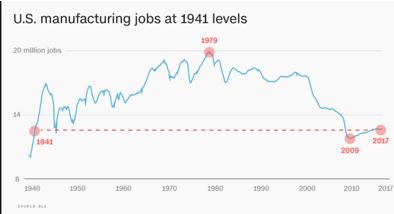GM Announcement Lays Bare Shortcomings of Trump's Economic Agenda

“Bringing manufacturing back to America, creating high wage jobs, was one of our campaign promises and themes” Donald Trump proclaimed to a room full of reporters in early 2017, less than one month after being sworn in as the 45th President of the United States.
Trump’s focus on manufacturing jobs dates back to some of the earliest days of his campaign, and served as the rationale for pulling out of the Trans-Pacific Partnership and renegotiating NAFTA. It also was the reason he lobbied Foxconn to build a new plant in Wisconsin, ultimately accomplishing this goal despite forcing Wisconsinites to foot a $4.1 billion bill that will go toward subsidizing the costs of the plant.
All said, the Foxconn deal costs taxpayers about $230,000 per job, and the factory isn’t expected to turn a profit for at least 20 years. Truly ironic is the fact that, Trump, who claims to be a free market capitalist, is now providing government handouts for the creation of new businesses that would in no way be feasible on their own.
Republicans who are concerned of America’s inching toward socialism should probably pay attention to what their president is doing in this respect.
At any rate, it is clear that the Trump administration has made manufacturing jobs a central part of their economic platform, but the evidence that this is a mistake is mounting.
Just this week, General Motors announced that they would shut down five different factories and lay off 15% of all salaried workers so that they could focus on production of autonomous and fully electric vehicles. To be sure, this is absolutely not the fault of Donald Trump or any one individual but rather, it is the continuation of a trend that has been underway since 1980.

Since the number of manufacturing jobs peaked in 1979, advancements in technology have allowed manufacturing plants to maintain or even grow output levels with less human capital. Even with the Trump administration’s intense focus on reviving the manufacturing sector, manufacturing activity hit a six month low in October, with industry heads citing tariffs as a main reason for the slowdown.
Pertaining to GM specifically, CEO Mary Barra claims the plants were shutting down due to “changing market conditions” (a euphemism for ‘tariffs and a slowing global economy’) as well as a lack of “consumer demand.” Logically, this brings us to Trump’s tax cuts.
In December 2017, Trump signed a massive corporate tax cut that he claimed would lead to more jobs (even though there were about as many jobs as unemployed people in the US) and higher wages. Most economist, however, claimed that most of that money would go toward stock buybacks, just like they did when President Bush cut taxes.
In GM’s case, this is actually exactly what happened, with the company using that tax money to buy back $4.5B of its own stock. If nothing else, this should serve as proof that trickle down economics does not work, because if it did, GM would be building more plants, not closing them.
Another source of concern is Trump’s response to GM’s actions. Rather than attempting to understand how “changing market conditions” are forcing American manufacturers to adapt, Trump has simply threatened that GM’s CEO would have a “big problem” if she did not quickly open a new plant in Ohio.
Ohio, of course, is a critical swing state that Trump likely must win in 2020 if he wishes to serve a second term.
This course of action parallels what Trump does when faced with a roadblock of any kind: rather than changing his ways or realizing that his previous course of action may have had negative impacts, he simply threatens people who do not act in a way that directly benefits him, even if it is what is best for themselves or their business.
Again, Republicans who are concerned with America becoming more like Venezuela should be alarmed when the head of our government threatens private citizens who don’t follow his personal demands.
If we view “Make America Great Again” through a strictly economic lens, we would likely envision a post World War II America, with an economy replete with manufacturing jobs and opportunity. Trump’s entire campaign was predicated on the idea that if he were elected, he would once again create a booming manufacturing economy by lowering taxes and reducing regulation.
Unfortunately, this has not come to pass, as manufacturing plants are continuing to close their doors and large companies are continuing with layoffs, even after their large tax cut. Just for fun, here is a list of companies that took their tax money and laid off workers:
- Pfizer
- AT&T
- Kimberly Clark (makers of Kleenex)
- Comcast
- Harley-Davidson
- Walmart
- Citi Bank
- McDonalds
- HP
- Tenet Healthcare
- Carrier
- Tesla
- Microsoft
- Schneider Electric
- Coca Cola
- Dunkin’ Donuts
To be sure, despite the fact that the economy is cooling off, it is still strong, and despite the layoffs from the companies listed above, unemployment is still near all-time lows. However, the evidence is mounting that Trump’s economic strategy is one of the past, not one of the future, and is generally bereft of any coherent, long-term strategy.
There is an overwhelming amount of evidence that suggests Trump’s tax cuts were a form of corporate welfare that did little to improve the day-to-day lives of typical Americans.
Reading this article, you may have seen quite a bit of blue hyperlinks that, if clicked, would direct you to a place where you could learn more about each topic. This should serve as a reminder that the nuggets of information put forth in this article are not drawn from opinion, but drawn from facts and data instead, and that is how it should be.
Photo Credit: John Grass Media Inc / shutterstock.com




